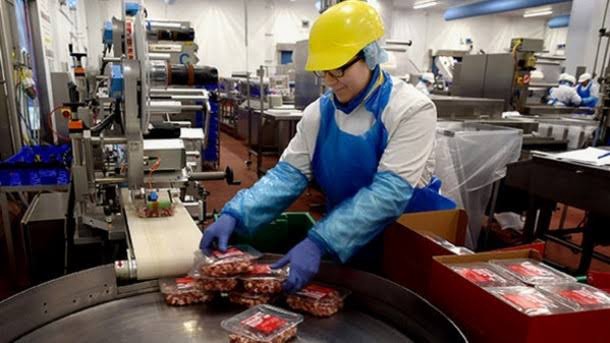The food processing industry is a vital component of the United Kingdom’s economy, encompassing a wide range of activities from farming and food production to retail and food services. This sector involves various processes, including chopping, freezing, heating, fermenting, and the addition of functional ingredients like additives.
The industry utilizes over 18.6 million hectares of farmland for both animal husbandry and crop cultivation. However, it’s important to note that the UK’s food production is not sufficient to meet the country’s total demand. Approximately 58% of the food consumed in the UK is produced domestically, while slightly less than a quarter is sourced from the European Union.
The food and drink manufacturing sector is a significant contributor to the UK economy. In 2021, the sector contributed £30 billion and experienced a growth rate of 4.2% compared to the previous year. The industry’s total turnover exceeds £112 billion, accounting for 20% of the nation’s total turnover. The gross value added (GVA) of the food sector, excluding agriculture and fishing, was £115.2 billion in 2021, reflecting a 12.3% increase since 2020.
Job Opportunities in the Food Processing Industry for Immigrants in Leeds
In this article, we explore the various job opportunities available for immigrants interested in working in the UK’s food processing industry, specifically in Leeds. We also highlight current job openings that offer visa sponsorship.
Key Roles in the Food Processing Industry:
- Food Factory Worker:
- Responsibilities: Working on a production line, adhering to strict food safety and quality standards, operating machinery, ensuring a steady supply of raw materials, packing food products, and maintaining cleanliness. This role is essential for the efficiency of food production processes.
- Food Technologist:
- Responsibilities: Ensuring product quality and safety by modifying existing products and processes, developing new food products, and improving safety and quality control procedures from raw materials to finished products.
- Process Technologist:
- Responsibilities: Managing product development from the recipe stage to finished products, optimizing processes, ensuring compliance with food safety regulations, conducting trials and pre-production tests, and supporting the launch of new food items.
- Electrical Design Engineer (Food Processing):
- Responsibilities: Designing custom low-voltage switchboards and motor control centers for food processing solutions, ensuring electrical safety and efficiency in food production facilities, and collaborating with other engineers and technicians.
Required Qualifications for Food Processing Jobs in the UK:
Qualifications for roles in the food processing industry vary depending on the specific job and employer. Common requirements include:
- High School Diploma or GED: A high school education is often preferred by employers, though some roles may not require formal education beyond this level.
- Safety Standards and Training: Adherence to safety protocols, hygiene practices, and proper handling of equipment and ingredients is essential. Companies typically provide necessary training.
- Basic Math and Reading Comprehension Skills: Accurate measurement of ingredients and the ability to follow written instructions are crucial.
- Experience and Training: Experience in food production or an industrial kitchen is advantageous, with some companies preferring candidates with at least six months of relevant experience or training.
- Physical Strength and Stamina: The work often involves lifting heavy materials, operating machinery, and standing for extended periods.
Specialized roles, such as food technologists and process technologists, may require additional qualifications, including degrees in food science, engineering, or related fields.
Key Certifications for Food Processing Workers in the UK:
Certifications are vital for ensuring safety, quality, and compliance in the food processing industry. Notable certifications include:
- GFSI Recognized Schemes: Certifications such as BRC Global Standards, GlobalG.A.P., SQF, and IFS for food.
- Animal Welfare and Sustainability Certifications: Certifications like Cage-Free, Antibiotic-Free, and programs focused on sustainable sourcing such as UTZ and 4C.
- HACCP (Hazard Analysis and Critical Control Points): A systematic approach to food safety, widely recognized and essential for safe food production.
- ISO 22000: A food safety management system standard that covers the entire food supply chain.
- Good Manufacturing Practice (GMP): Ensures consistent production and control of food products according to quality standards.
- Certified Food Manager (CFM): Demonstrates expertise in food safety management.
Current Food Processing Roles with Visa Sponsorship in Leeds:
Here are some current job opportunities in Leeds that offer visa sponsorship:
- Process Technologist, Food Manufacturing
- Company: Focus Management Consultants
- Description: A full-time position responsible for managing product development within a food manufacturing business Apply Here
- Food and Beverage Assistant
- Company: David Lloyd Leisure
- Description: A full-time role involving serving food and beverages, maintaining cleanliness, and ensuring a positive customer experience.
- Apply Here
- Electrical Engineer (Food Manufacturing)
- Company: Major Talent
- Description: A full-time position focusing on electrical design and maintenance within a food manufacturing context.
- Apply Here


